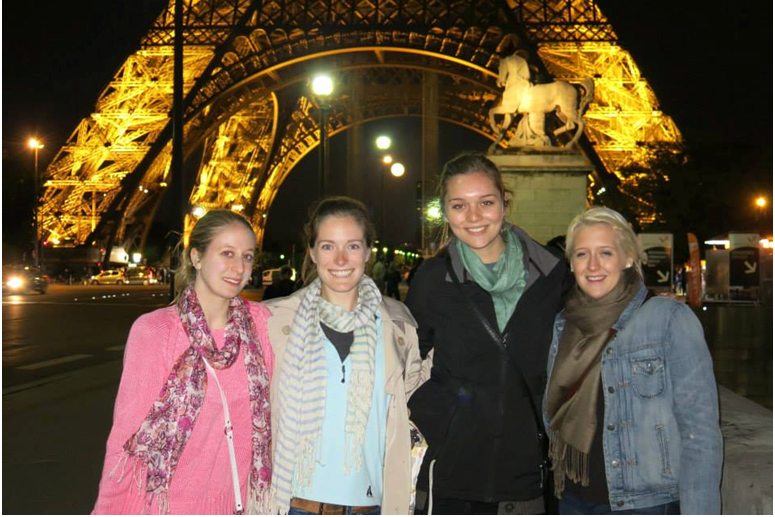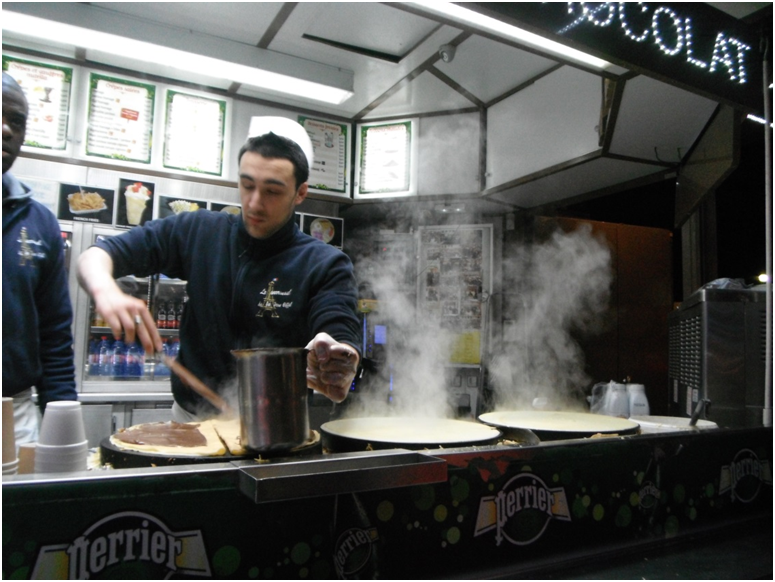Posted: September 5, 2013
I got to eat Nutella crepes underneath the Eiffel Tower and to learn about foreign agricultural trade from within the French U.S. embassy, and I wouldn’t trade these experiences for the world.

Standing under the sparkling Eiffel Tower on our last night together in Paris
As are many of life's greatest decisions, my decision to participate in an embedded course to France was spontaneous. Although the idea of travel always intrigued me, I had never thought of going to France until one day I noticed a mention of an information session for an embedded course entitled INTAG/AG BM 499 E US/French Ag and Food Systems while skimming over the College of Ag newsletter and decided to attend. Immediately after leaving the info session, I called my mom, emphatically explained to her how much I could learn for such a reasonable price, and the plan was set into motion. I knew about five words of French, three of which were food, but I was ready to take on the challenge.
The goal of the course was to compare the French food system to the American, including a two-week trip to Paris, France at the end of the spring 2013 semester. We covered topics like GMO's, the environmental implications of agriculture, health and diet, agribusiness, and the organic food industry. Most of these subjects have a lot of controversial and "gray" areas, which led to some of the most interesting discussions I've had in a class. The course also gave me the opportunity to interact with students from different majors like animal sciences and biological engineering, which brought many unique perspectives on current issues to my attention.
When the day finally came for me to get on the plane, I pushed back any trace of nervousness I had and faced the new land of France with excitement and an open mind. Paris exceeded my expectations. All of the architecture is so beautiful, with ornate balconies and cobblestone streets and gorgeous bridges and flowers everywhere. There is a law in Paris that no building can be constructed over 100 meters high, so the city retains its classic charm without the looming skyscrapers of other cities. Yet through all of this, one could still find graffiti and the sound of car horns, albeit from much smaller vehicles than in the U.S., reminiscent of people and cities everywhere.
new land of France with excitement and an open mind. Paris exceeded my expectations. All of the architecture is so beautiful, with ornate balconies and cobblestone streets and gorgeous bridges and flowers everywhere. There is a law in Paris that no building can be constructed over 100 meters high, so the city retains its classic charm without the looming skyscrapers of other cities. Yet through all of this, one could still find graffiti and the sound of car horns, albeit from much smaller vehicles than in the U.S., reminiscent of people and cities everywhere.
We stayed in the Cite Universitaire dormitory, which reminded me a lot of being back in the Penn State dorms, except here we were just a quick metro ride away from the Eiffel Tower and the Louvre. Because we were students at AgroParisTech, we were able to receive metro passes that normally only Parisian citizens can have. These passes were one of the most important perks of the trip because they allowed us to travel anywhere in the city without fear of being unable to find our way back. This freedom to explore was invigorating and gave me confidence in my ability to act independently. Outside of class hours, we were able to see famous places like the beautiful church at Sacre Coeur and Moulin Rouge and to explore Paris' many museums. My favorite was the Museé d'Orsay, which has the largest impressionist collection in the world, but I also visited the Louvre and the very interesting Pompidou Centre museum of modern art.
Of course along with our free time for exploration, we also had class time and guided tours a nd visits. Our classes were held in an AgroParisTech classroom and were conducted by French professors and industry professionals. I found that the French food industry is centered around tradition with a focus on quality, as opposed to quantity. The French people still buy most of their food from small, specialized shops, a feature in stark contrast with grocery shopping in America where a Walmart can be found in almost every town. The French are very proud of their food, as they should be. There were also several discussions of the "French paradox," which I found especially interesting given my interest in nutrition. Some of my favorite lectures abroad were the lectures on animal welfare and sensory perception, which was followed by a cheese tasting. We also visited Rungis, the world's largest wholesale market and went on a "chocolate tour" to several of Paris' artisan chocolatiers, one of which is where I tried my first macaroon and fell in love. For me, the highlight of the course was our day in the Champagne region of France. We toured expansive cellars and learned all about the production process from grape selection to riddling to labeling and finally tasting. The growers' and winemakers' pride for their product was overwhelmingly apparent, and it was an experience I feel lucky to have had.
nd visits. Our classes were held in an AgroParisTech classroom and were conducted by French professors and industry professionals. I found that the French food industry is centered around tradition with a focus on quality, as opposed to quantity. The French people still buy most of their food from small, specialized shops, a feature in stark contrast with grocery shopping in America where a Walmart can be found in almost every town. The French are very proud of their food, as they should be. There were also several discussions of the "French paradox," which I found especially interesting given my interest in nutrition. Some of my favorite lectures abroad were the lectures on animal welfare and sensory perception, which was followed by a cheese tasting. We also visited Rungis, the world's largest wholesale market and went on a "chocolate tour" to several of Paris' artisan chocolatiers, one of which is where I tried my first macaroon and fell in love. For me, the highlight of the course was our day in the Champagne region of France. We toured expansive cellars and learned all about the production process from grape selection to riddling to labeling and finally tasting. The growers' and winemakers' pride for their product was overwhelmingly apparent, and it was an experience I feel lucky to have had.
This trip was a huge lesson in communication. Many French people speak English, but we still tried to at least begin our conversations in French as a sign of courtesy. Despite some language mishaps, it seemed we were always able to get our point across in the end. But more importantly than the language barrier, I learned what it's like to be a foreigner. Experiencing cultural differences and differing opinions, especially on food, has allowed me to be more open minded and to see current agricultural and social issues in a new light, which will be an invaluable skill in my future career and life. I feel so fortunate to have had the opportunity to learn as much as I did. I got to eat Nutella crepes underneath the Eiffel Tower and to learn about foreign agricultural trade from within the French U.S. embassy, and I wouldn't trade these experiences for the world.
Ag Sciences Global
Address
106 Agricultural Administration BuildingUniversity Park, PA 16802
- Email globalag@psu.edu
- Office 814-863-0249
- Fax 814-865-3055
Ag Sciences Global
Address
106 Agricultural Administration BuildingUniversity Park, PA 16802
- Email globalag@psu.edu
- Office 814-863-0249
- Fax 814-865-3055

